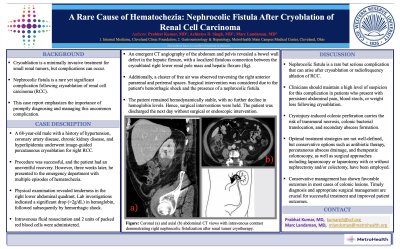Tuesday Poster Session
Category: Colon
P3075 - A Rare Cause of Hematochezia: Nephrocolic Fistula After Cryoblation of Renal Cell Carcinoma
Tuesday, October 24, 2023
10:30 AM - 4:00 PM PT
Location: Exhibit Hall

Has Audio
- PK
Prabhat Kumar, MD
Cleveland Clinic Foundation
Cleveland, OH
Presenting Author(s)
Prabhat Kumar, MD1, Achintya D. Singh, MD, MBBS2, Marc Landsman, MD2
1Cleveland Clinic Foundation, Cleveland, OH; 2MetroHealth Medical Center, Case Western Reserve University, Cleveland, OH
Introduction: Hematochezia is a common consultation for gastroenterologists. We describe a rare cause of nephrocolonic fistula presenting with gastrointestinal bleeding. Cryoablation is a minimally invasive treatment for renal cell carcinoma (RCC), but complications can occur. This case report emphasizes the importance of promptly diagnosing and managing this uncommon complication of Nephrocolonic fistula following cryoablation of RCC.
Case Description/Methods: A 68-year-old male with a history of hypertension, coronary artery disease and CKD underwent image-guided percutaneous cryoablation for right RCC. The procedure was successful, and the patient had an uneventful recovery. However, three weeks later, he presented to the emergency department with multiple episodes of bright red blood per rectum. Physical examination revealed tenderness in the right lower abdominal quadrant. Laboratory investigations indicated a significant drop ( >2g/dL) in hemoglobin and subsequent hemodynamic compromise and hemorrhagic shock. Fluid resuscitation and 2 units of packed red blood cells were administered. An emergent CT angiography of the abdomen revealed a bowel wall defect in the hepatic flexure, with a localized fistulous connection between the cryoablated right lower renal pole mass and the hepatic flexure (fig). Surgical intervention was considered due to the patient's hemorrhagic shock and presence of a nephrocolonic fistula. However, patient remained hemodynamically stable, with no further decline in hemoglobin levels, resulting in the decision to withhold surgical and endoscopic intervention. The patient was discharged the next day with no further bleeding or hemodynamic compromise.
Discussion: Nephrocolonic fistula is a rare but serious complication that can arise after cryoablation or radiofrequency ablation of RCC. Clinicians should maintain a high level of suspicion for this complication in patients who present with persistent abdominal pain, blood stools, or weight loss following cryoablation. Optimal treatment strategies are not well-defined, but conservative options such as antibiotic therapy, percutaneous abscess drainage, and therapeutic colonoscopy, as well as surgical approaches, including laparoscopy or laparotomy with or without colectomy, have been employed. Conservative management has shown favorable outcomes in most cases of colonic lesions. Timely diagnosis and appropriate management with antibiotics and surgical consultation are crucial for successful treatment and improved patient outcomes.

Disclosures:
Prabhat Kumar, MD1, Achintya D. Singh, MD, MBBS2, Marc Landsman, MD2. P3075 - A Rare Cause of Hematochezia: Nephrocolic Fistula After Cryoblation of Renal Cell Carcinoma, ACG 2023 Annual Scientific Meeting Abstracts. Vancouver, BC, Canada: American College of Gastroenterology.
1Cleveland Clinic Foundation, Cleveland, OH; 2MetroHealth Medical Center, Case Western Reserve University, Cleveland, OH
Introduction: Hematochezia is a common consultation for gastroenterologists. We describe a rare cause of nephrocolonic fistula presenting with gastrointestinal bleeding. Cryoablation is a minimally invasive treatment for renal cell carcinoma (RCC), but complications can occur. This case report emphasizes the importance of promptly diagnosing and managing this uncommon complication of Nephrocolonic fistula following cryoablation of RCC.
Case Description/Methods: A 68-year-old male with a history of hypertension, coronary artery disease and CKD underwent image-guided percutaneous cryoablation for right RCC. The procedure was successful, and the patient had an uneventful recovery. However, three weeks later, he presented to the emergency department with multiple episodes of bright red blood per rectum. Physical examination revealed tenderness in the right lower abdominal quadrant. Laboratory investigations indicated a significant drop ( >2g/dL) in hemoglobin and subsequent hemodynamic compromise and hemorrhagic shock. Fluid resuscitation and 2 units of packed red blood cells were administered. An emergent CT angiography of the abdomen revealed a bowel wall defect in the hepatic flexure, with a localized fistulous connection between the cryoablated right lower renal pole mass and the hepatic flexure (fig). Surgical intervention was considered due to the patient's hemorrhagic shock and presence of a nephrocolonic fistula. However, patient remained hemodynamically stable, with no further decline in hemoglobin levels, resulting in the decision to withhold surgical and endoscopic intervention. The patient was discharged the next day with no further bleeding or hemodynamic compromise.
Discussion: Nephrocolonic fistula is a rare but serious complication that can arise after cryoablation or radiofrequency ablation of RCC. Clinicians should maintain a high level of suspicion for this complication in patients who present with persistent abdominal pain, blood stools, or weight loss following cryoablation. Optimal treatment strategies are not well-defined, but conservative options such as antibiotic therapy, percutaneous abscess drainage, and therapeutic colonoscopy, as well as surgical approaches, including laparoscopy or laparotomy with or without colectomy, have been employed. Conservative management has shown favorable outcomes in most cases of colonic lesions. Timely diagnosis and appropriate management with antibiotics and surgical consultation are crucial for successful treatment and improved patient outcomes.

Figure: Figure: Coronal (a) and axial (b) abdominal CT views with intravenous contrast demonstrating right nephrocolonic fistulization after renal tumor cryotherapy.
Disclosures:
Prabhat Kumar indicated no relevant financial relationships.
Achintya Singh indicated no relevant financial relationships.
Marc Landsman indicated no relevant financial relationships.
Prabhat Kumar, MD1, Achintya D. Singh, MD, MBBS2, Marc Landsman, MD2. P3075 - A Rare Cause of Hematochezia: Nephrocolic Fistula After Cryoblation of Renal Cell Carcinoma, ACG 2023 Annual Scientific Meeting Abstracts. Vancouver, BC, Canada: American College of Gastroenterology.
